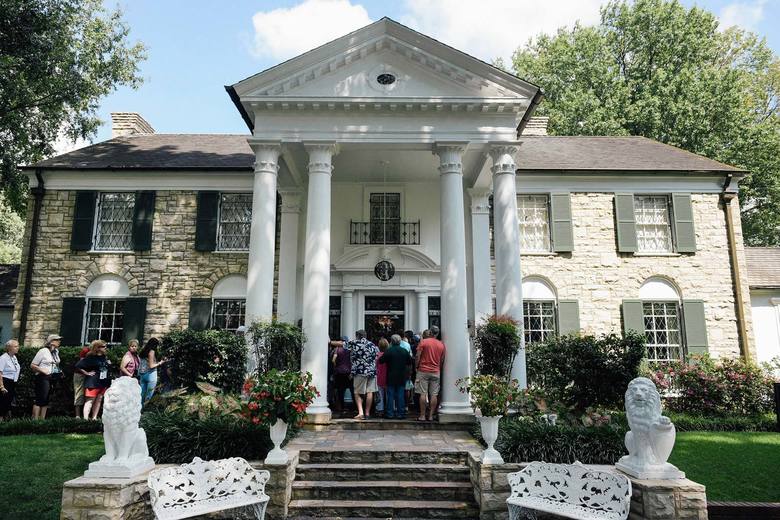The competition for Amazon’s second headquarters brought renewed scrutiny to the corporate welfare deals that cities, counties, and states offer to get companies to pick up and move—or stay put. No enterprise seems too grounded to play the game; treasured “hometown” sports teams are some of the worst offenders.
But even cynics might have been surprised to learn, in Sunday’s Wall Street Journal, that Graceland—the iconic Memphis home of Elvis Presley—was ready to decamp, brick by sacred brick, to Nashville, the Middle East, or East Asia after a bruising battle over public subsidy that featured three lawsuits filed against the city and a threat to fund an Elvis-respecting mayor to challenge incumbent Democrat Jim Strickland.
“We’ve had substantial offers to take every piece of wood and panel and move it,” Elvis Presley Enterprises head Joel Weinshanker told the paper.
City and county officials I spoke to denied that Graceland had ever threatened to leave, and EPE did not respond to my questions. Nevertheless, over the winter Memphis reached a preliminary agreement with EPE, the corporation that runs Graceland and the Presley estate, to give Graceland a bigger cut of city and county property and sales tax revenues for a new expansion project. (EPE is owned by a New York-based brand management company called Authentic Brands Group LLC.)
So why, you might ask, is a city that regularly ranks among the nation’s poorest giving several hundred million dollars in tax breaks to a long-dead rock star’s house museum where the cheapest ticket costs $41?
The answer illustrates the deep trap American cities have built for themselves by giving corporations of a certain size the expectation of special, negotiated tax deals everywhere they go.
Since 2015, local officials have carved out tax exemptions designed to help Memphis’ flagship attraction expand with a hotel, museum, and exhibition facility. (Those exemptions include a state designation called a “tourism development zone,” which allows Graceland to capture much of the sales tax revenue generated on-site, rather than forking it over to the city, county, and state.) Some of the money that Graceland would otherwise have paid as property tax is instead going toward paying off more than $100 million in bonds that a county economic development corporation, EDGE, issued on behalf of Elvis Presley Enterprises. “If we had not invested the money, the project would not have happened,” Reid Dulberger, the president of EDGE, told me on Monday of Graceland’s expansion.* “Let’s be fair: The man passed away in 1977. That’s 42 years ago. At some point, his contemporary fans are no longer coming to visit Graceland. Graceland is dependent on a new generation of fans.”
I sort of see his point. When I, a millennial, visited Memphis in 2011, I skipped Graceland—the prices seemed too high for a pop star of fading relevance. Today, a Mansion Only tour is $41, seeing the airplanes is $5 more, and none of that includes “Elvis automobiles, jumpsuits, gold and platinum records and items relating to Elvis’ career.” Those are another $15. But maybe what a new generation wants is conference rooms.
Shortly after the museum-hotel expansion was approved in 2015, EPE decided it wanted to do even more: cabins, an RV park; more retail, exhibit, and conference space; new hotel rooms, and plane hangars. Also a 6,200-seat arena and a manufacturing facility, where local workers would be paid $15.50 an hour to make objects like Chia Pets for Graceland’s gift shops. The company and the city came to a preliminary agreement in February that approves those plans and dedicates even more tax revenue to the Graceland master plan, which the company claims will involve $100 million in investment, and includes an agreement to grant $150,000 a year in local community groups for five years.
The current package would add up to between $194 million and $269 million in reduced taxes for Graceland, Dulberger said. But he stressed the expansion would not have happened without those incentives, and would be a net gain for the city and county on tax revenue alone.
This is the typical logic backing America’s $45 billion–or-so in annual local tax breaks for corporations. It rests on the believability of the corporation’s threats to relocate or not invest at all. In reality, growth often happens one way or another, and corporate welfare does not have a track record of producing great results. But it’s also true that cities have weakened their hands by making subsidies the norm.
Which brings us to the reason the February truce may be tentative. The reason Elvis Presley Enterprises has sued Memphis three times over this expansion imbroglio is that it would very much like to build that 6,200-seat arena. But Memphis can’t let EPE do that with public money, because Memphis already used public money to build an arena to lure the Grizzlies from Vancouver, and in doing so promised that the city wouldn’t build an arena for anyone else. Not even Elvis. The city is worried that a taxpayer-funded Graceland Arena would violate its contract with the taxpayer-funded basketball team. It’s a subsidy standoff.
The February agreement, one component of which the Memphis City Council may vote on this month, represents a compromise of sorts: It says EPE will spend $12 million on “sound stages,” but takes pains to note there will be no arena at all.
An official with the city of Memphis told me there may be storm clouds on the horizon if Elvis Presley Enterprises expects to use those stages for live music. Wikipedia defines a sound stage as “a soundproof, hangar-like structure, building, or room, used for the production of theatrical film-making and television productions.” But the sense at City Hall is that Graceland has not given up on its plans to build a proper concert venue.
They can do that if they want—but it’s the one thing the city of Memphis can’t pay for.
Correction, April 9, 2019: This piece originally misspelled Reid Dulberger’s first name.
